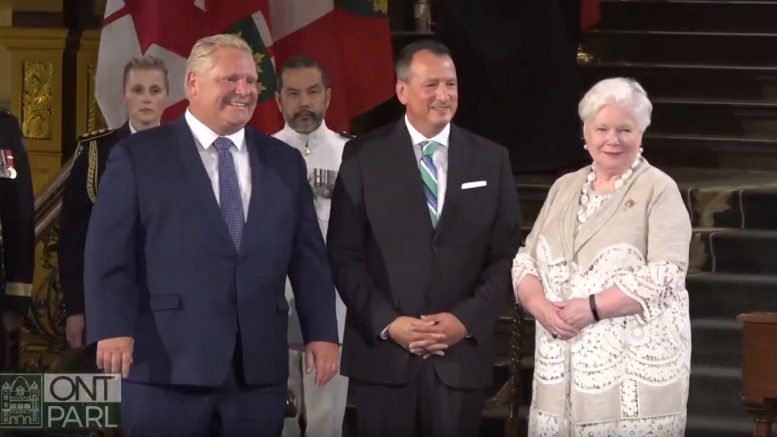The swearing-in on June 29 of new Ontario Premier Doug Ford and his Progressive Conservative majority government promises somewhat more mining-friendly policies in the province that remains Canada’s mining powerhouse.
The first order of business for the new government was streamlining the number of ministers in cabinet, which had ballooned to 29 under the previous Liberal government after 15 years in power, and now sits at 21 cabinet members.
Greg Rickford, 50, elected for the first time as a Member of the Provincial Parliament for the northwestern Ontario riding of Kenora–Rainy River, has a dual portfolio as Minister of Energy, Northern Development and Mines (a reflection of newly amalgamating the Ministry of Energy with the Ministry of Northern Development and Mines), as well as Minister of Indigenous Affairs.
Rickford will carry out the duties performed by three individual ministers in the previous government.
In 2016 under former premier Kathleen Wynne, Ontario’s Aboriginal Affairs ministry had been renamed the Ministry of Indigenous Relations and Reconciliation, with David Zimmer as the sole minister responsible.
Though new to provincial politics, Rickford is no political newbie, having served two terms as a federal Member of Parliament for Kenora in Stephen Harper’s Conservative government, before losing his seat in the 2015 federal election.
From 2010 to 2015, Rickford stacked up progressively greater roles in the Harper government, including Parliamentary Secretary for Official Languages (he is fully bilingual); Parliamentary Secretary to the Minister of Indigenous and Northern Affairs; Minister of State for Science and Technology; Minister for the Economic Development Initiative for Northern Ontario; and finally succeeding Joe Oliver as Minister of Natural Resources from March 2014 until November 2015, when the government fell.
In April 2017 he joined the board of Noront Resources, which is developing mineral assets in Ontario’s Ring of Fire region, but stepped down in December 2017 upon declaring his candidacy for local MPP.
Born in Paris, Ont., Rickford holds law degrees from McGill University, an MBA from Université Laval in Quebec City, a BSc in nursing from Victoria University at the University of Toronto, and a diploma in Nursing from Mohawk College.
Before becoming a politician, Rickford worked as a nurse and lawyer in remote First Nation communities in Kenora District.
While there has been disappointment by some First Nation representatives and commentators that the ministerial responsibilities for Aboriginal Affairs have been folded into those of Energy, Northern Development and Mines — and more broadly concern over the signal that sends — there remains ample praise for Greg Rickford as he takes on the role.
Newly elected Ontario Regional Chief RoseAnne Archibald (who defeated incumbent Isadore Day in late June to become Ontario’s first female regional chief, after previously serving as Deputy Grand Chief of Nishnawbe Aski Nation) writes in a statement she is “disappointed” there’s no longer a sole minister of Indigenous relations and reconciliation, but is “heartened” Rickford is overseeing the new portfolio.
“As the MPP for Kenora-Rainy River, Minister Rickford is by far the best choice to work with our Peoples. He has worked as a nurse and lawyer in our communities and has a deep knowledge and understanding of our Peoples and the issues,” she writes.
Other immediate measures enacted by the new Ford government include a rapid but orderly wind-down of the province’s cap-and-trade carbon tax regime; a hiring freeze in the provincial government; and a wage freeze for provincial government employees not part of an existing collective bargaining agreement.
Said Ford of the carbon tax move: “Cap-and-trade and carbon tax schemes are no more than government cash grabs that do nothing for the environment, while hitting people in the wallet in order to fund big government programs. I promised that the party with taxpayers’ dollars was over and that this would include scrapping the cap-and-trade carbon tax slush fund … we are getting Ontario out of the carbon tax business.”



Be the first to comment on "Editorial: New Ontario gov’t streamlines ministries, axes carbon tax"